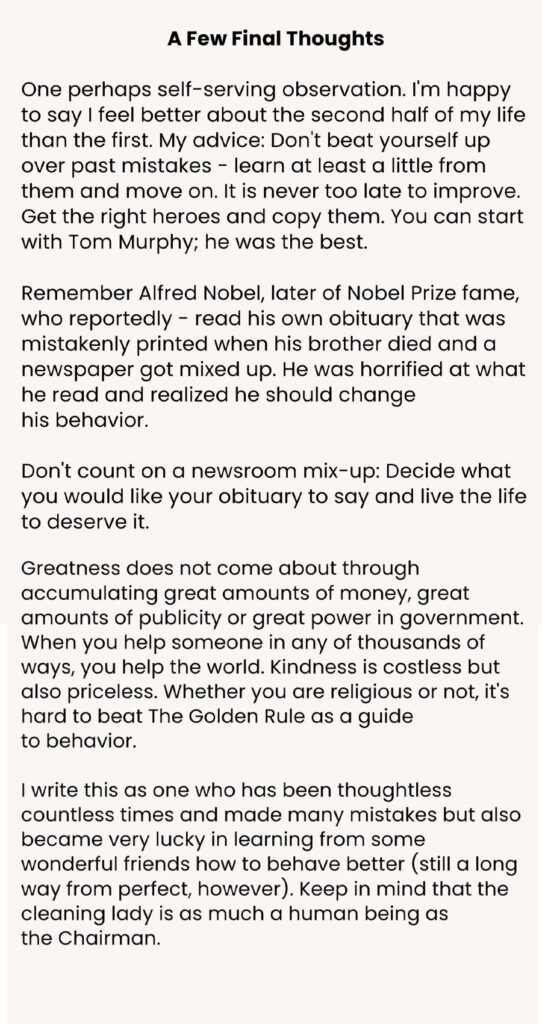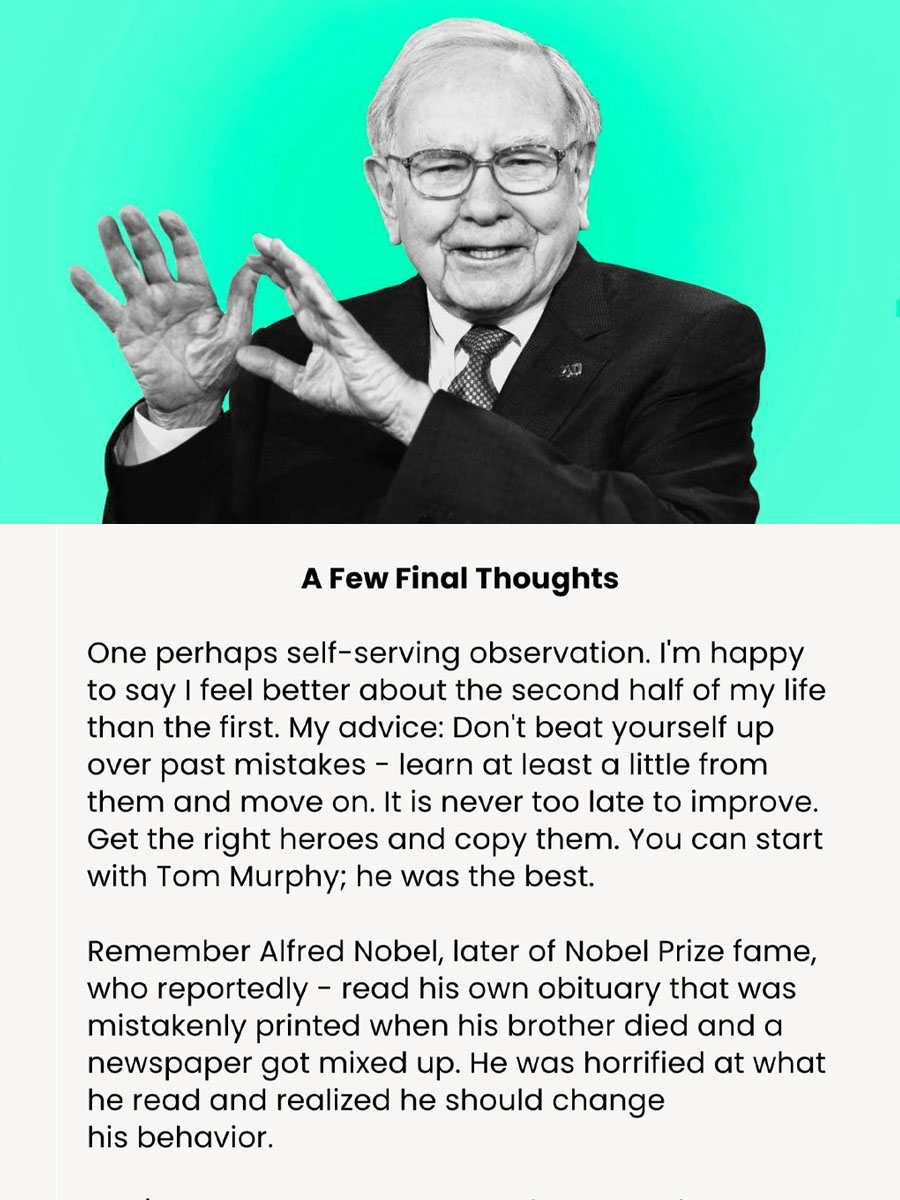One of the greatest heroes of my life is quietly stepping off the stage.
It feels strange even saying it — Warren Buffett, the Oracle of Omaha himself, has written what he calls his final letter to shareholders. He’s 95 years old now, and as he closes this remarkable chapter, I can’t help but reflect on how deeply his teachings have shaped my life.
The man didn’t just teach us how to invest. He taught us how to live — with patience, humility, and a little bit of common sense that somehow feels rare these days.

The Power of Compounding (and Patience)
Buffett didn’t build his empire overnight. Nope, no crypto shortcuts, no “get rich quick” schemes. His wealth was the product of relentless compounding over six decades — 63 years, to be exact.
He started investing at the ridiculously young age of ten, buying his first stock while most kids were still collecting marbles. By 32, he’d earned his first million dollars — and that was way back in 1962, when a million dollars was serious money.
Fast forward to 1986, and he was a billionaire. By 2010, $50 billion.
Today? Roughly $130 billion — and he’s given away $51 billion of that to charity.
But here’s the kicker: 99% of his fortune came after he turned 60.
Yeah, let that sink in. While most people his age were planning retirement, Buffett’s wealth was just getting started. So, the next time someone says they’re too old to invest, remember — Buffett didn’t just age like fine wine; his money did too.
The Magic Number: 18.6%
This is the number Buffett fans (like me) never forget. His average annual growth rate over his lifetime of investing was 18.6%. That’s compounding magic.
People today love chasing 30%, 40%, even 50% returns — usually through risky bets and overnight hype. But here’s the truth: sustaining 18% for decades? That’s god-tier performance.
Personally, I’ve never even come close. My portfolio averages around 15% on a good year — and that’s mostly in equities. Throw in safer stuff like CPF, T-bills, or fixed deposits, and the blended return drops even more.
So, when someone claims they can “easily make 50% a year,” I just smile and think, Sure, buddy — even Warren Buffett couldn’t.
Let’s be real: a steady 10% return is already phenomenal. Consistency always beats hype. Buffett proved that slow compounding, not flashy gambling, builds unshakable wealth.
Living Simply When You Can Afford Anything
This part of Buffett’s story hits me right in the chest.
He’s worth billions but still lives in the same Omaha house he bought in 1958 for $31,000. Today, that house is worth around $14 million — and he’s been there for 67 years.
That’s not frugality for the sake of it; it’s comfort in simplicity. He’s warm in winter, cool in summer, and surrounded by memories. It made me realize something: it’s not the house that makes a home — it’s the people in it.
That’s why I still live simply, too. Sure, I could splurge, but I’d rather see my money grow quietly in the background. My home doesn’t need to scream success — it just needs to feel warm.
The Modest Car, The McDonald’s Breakfast, and The Coke Habit
If you ever thought billionaires drive flashy cars and dine on gold-plated caviar — think again.
Buffett drove an old car for years before his daughter begged him to upgrade. Even then, he went for a 2015 Cadillac — not exactly a Lamborghini.
And his breakfast routine? Straight out of a sitcom. Every morning, he swings by McDonald’s. If Berkshire Hathaway had a bad day, he orders the cheaper meal — a $2.61 burger. If it’s a good day, he splurges on one with cheese.
Oh, and he doesn’t drink water. He drinks Coca-Cola — like, all the time. The man’s blood type might as well be “Coke Positive.”
But honestly, it’s iconic. Buffett’s wealth doesn’t control him. He enjoys what he likes, lives simply, and never pretends to be something he’s not.
The Humble Office and His $51 Billion Gift
Now, you’d think a man who runs a multi-billion-dollar company would have a massive, futuristic headquarters. Nope.
Berkshire Hathaway’s HQ? One floor. Twenty-five employees. One old-school phone. No computer. That’s it.
Even my own workspace is fancier — and that’s saying something.
Buffett doesn’t need luxury to lead. His empire runs on trust, not tech. And his humility extends far beyond business — he’s donated over $51 billion through four family foundations and the Bill & Melinda Gates Foundation.
He admits he’s not good at giving money away — so he lets others handle it. That kind of self-awareness is rare and refreshing.
Lessons from His Final Letter
Buffett’s last letter wasn’t about money. It was about life.
He reminded us not to beat ourselves up over mistakes. If you live long enough, he said, those mistakes won’t matter much. That hit me hard. I’ve made my share of stupid decisions — said the wrong things, missed opportunities, nearly burned out. But Buffett’s message? Let it go. Learn. Move forward.
He also said, “Choose your heroes wisely.” His were Benjamin Graham and Charlie Munger — two men who shaped his thinking. Graham taught him discipline. Munger taught him wisdom. Together, they shaped the greatest investor of our time.
The Real Enemy: Envy and Comparison
Buffett once warned about the “toxic culture” of envy in corporate America — especially around money. He believed that comparing salaries and success only breeds unhappiness.
And he’s right. Comparison is the thief of joy. I’ve seen people lose themselves chasing someone else’s lifestyle, forgetting what truly matters.
Buffett earns a modest salary by billionaire standards, yet he radiates contentment. He reminds us that greatness doesn’t come from wealth or power, but from kindness, humility, and helping others — whether it’s the CEO or the janitor.
That’s something I’ve tried to practice myself. When I meet people — whether in business or life — I make it a point to greet everyone with equal respect. You never know how much a smile or a handshake can mean to someone.
My Take: Staying Grounded in a World of Noise
One thing that really struck me was when Buffett said both he and Berkshire Hathaway did better because they were based in Omaha. Away from the chaos of Wall Street, he could think clearly and act rationally.
That’s something I can relate to. When I left corporate life, I finally felt free. No more endless comparisons, toxic egos, or fake smiles. Just me, doing what I love — on my own terms.
Sometimes, the best investment you can make is walking away from noise.
Wealth Without Ego
This is a lesson the world desperately needs. Wealth doesn’t need to be loud. Buffett proves you can be rich without flaunting it.
In Singapore and Malaysia, I’ve seen how wealth often turns into a fashion show — new cars, branded watches, giant houses. But true wealth is quiet. It’s security. It’s peace of mind. It’s knowing you don’t have to prove anything to anyone.
Buffett built his empire on patience, humility, and a long-term mindset. And that’s what I want to carry forward — not just financial wealth, but wealth in spirit.
A Legacy Worth Carrying On
So yes, it’s bittersweet to see Warren Buffett slowly fade from public life. But his legacy? That’s not going anywhere.
He taught us that compounding doesn’t just apply to money — it applies to kindness, humility, and gratitude. Every smile, every act of generosity, every bit of time you give away compounds into something much bigger than yourself.
That’s the real wealth he left behind. And I, for one, plan to keep that compounding.






